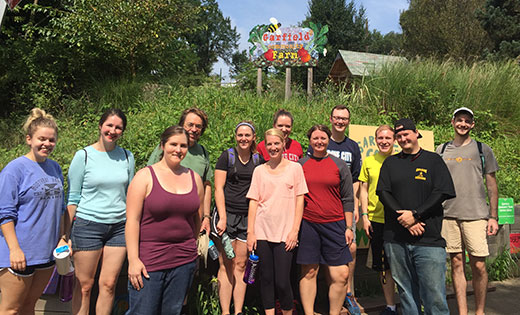Graduate Certificate in Urban Ministry
This hybrid certificate program is offered through the Seminary's Metro-Urban Institute and can be completed as a stand-alone certificate program or combined with a master’s degree program. MUI combines the theory and practice of collaborative community ministry with a program of urban theological education that prepares students for excellence in any context of ministry, but with particular attention to public realities affecting the urban environment.
Completing the Graduate Certificate in Urban Ministry Program
Those seeking the certificate must complete four classes (three credit-hours each) of graduate-level course work related to urban ministry. Required courses include those in urban ministry, contextual analysis, and an approved urban ministry elective.
Taking two classes per semester, the Certificate in Urban Ministry can be completed in one year. Students may also elect to take one course per semester and complete the program in two years. For those taking evening courses, the program can be completed over two academic years. This flexible certificate program easily fits students’ busy schedules. Because the program is hybrid, students can select in-person and online courses.
Whether you already have a master’s degree or you’re new to seminary, the Graduate Certificate in Urban Ministry is a great way to expand your theological education.
Applying to the Graduate Certificate in Urban Ministry Program
Students interested in this certificate program must complete Pittsburgh Theological Seminary’s standard application for admission process, and will ordinarily have an undergraduate degree. Merit scholarships and need-based financial aid are available.
Pittsburgh Seminary alums who have completed certain courses within the last 10 years may qualify for advance standing.
Urban Ministry Student Learning Outcomes
Upon completion of the certificate, students will be able to:
- Demonstrate the capacity to reflect theologically and sociologically on cultural, social, and ethical issues and how they shape the life of the church.
- Demonstrate the capacity to exegete and interpret the church’s various contexts as the location of God’s mission.
- Demonstrate theological and historical understanding of church pursuits of social justice.
- Demonstrate knowledge of racism in historical, social, and cultural contexts.
LEARN MORE ABOUT PITTSBURGH SEMINARY’S GRADUATE CERTIFICATE IN URBAN MINISTRY
The Graduate Certificate in Urban Ministry examines social and cultural factors shaping life in urban settings and wrestles theologically with ways life together within these contexts is nurtured through the church’s ministries, alignments, and presence.



